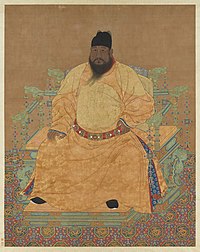| Xuande Emperor 宣德帝 | |||||||||||||||||||||||||
|---|---|---|---|---|---|---|---|---|---|---|---|---|---|---|---|---|---|---|---|---|---|---|---|---|---|
 | |||||||||||||||||||||||||
| Emperor of the Ming dynasty | |||||||||||||||||||||||||
| Reign | 29 May 1425 – 31 January 1435 | ||||||||||||||||||||||||
| Enthronement | 27 June 1425 | ||||||||||||||||||||||||
| Predecessor | Hongxi Emperor | ||||||||||||||||||||||||
| Successor | Emperor Yingzong (Zhengtong Emperor) | ||||||||||||||||||||||||
| Crown Prince of the Ming dynasty | |||||||||||||||||||||||||
| Tenure | 1 November 1424 – 29 May 1425 | ||||||||||||||||||||||||
| Predecessor | Crown Prince Zhu Gaochi | ||||||||||||||||||||||||
| Successor | Crown Prince Zhu Qizhen | ||||||||||||||||||||||||
| Imperial Grandson-heir of the Ming dynasty | |||||||||||||||||||||||||
| Tenure | 1411–1424 | ||||||||||||||||||||||||
| Predecessor | Imperial Grandson-heir Zhu Yunwen | ||||||||||||||||||||||||
| Born | 16 March 1399 Beijing, Ming dynasty | ||||||||||||||||||||||||
| Died | 31 January 1435 (aged 35) Palace of Heavenly Purity, Forbidden City, Beijing, Ming dynasty | ||||||||||||||||||||||||
| Burial | Jing Mausoleum, Ming tombs, Beijing | ||||||||||||||||||||||||
| Spouses | |||||||||||||||||||||||||
| Issue Detail | |||||||||||||||||||||||||
| |||||||||||||||||||||||||
| House | Zhu | ||||||||||||||||||||||||
| Dynasty | Ming | ||||||||||||||||||||||||
| Father | Hongxi Emperor | ||||||||||||||||||||||||
| Mother | Empress Chengxiaozhao | ||||||||||||||||||||||||
| Chinese name | |||||||||||||||||||||||||
| Chinese | 宣德帝 | ||||||||||||||||||||||||
| |||||||||||||||||||||||||
The Xuande Emperor (16 March 1399[2] – 31 January 1435), also known by his temple name as the Emperor Xuanzong of Ming, personal name Zhu Zhanji, was the fifth emperor of the Ming dynasty, reigned from 1425 to 1435. He was the son and successor of the Hongxi Emperor.
Zhu Zhanji was the son of Zhu Gaochi, who would later become the Hongxi Emperor. He had a passion for poetry and literature, and was also known for his skill in painting and warfare. In 1425, following his father's brief reign, he ascended to the throne as the emperor of the Ming dynasty. Upon taking power, he made the decision to reverse his father's plan to relocate the capital from Beijing to Nanjing. His uncle Zhu Gaoxu rebelled against the young emperor but was ultimately unsuccessful. With the guidance of capable advisors, the Xuande Emperor personally led his army against his uncle and easily defeated him.
In the early Xuande Emperor's reign, a prolonged war in Jiaozhi (present-day northern Vietnam) ended with Ming defeat and the Viet's independence. Relations with Southeast Asian nations stayed peaceful. Communication continued with Korea, and ties were established with Japan in 1432. The northern region faced minimal Mongol threats, with relations established with the Eastern Mongols and Western Oirats. The Xuande Emperor permitted Zheng He's final Indian Ocean voyage in 1431–1433. During the Xuande Emperor's rule, eunuchs gained influence, particularly in the secret police. The emperor sought order through purges in the Censorate and military service reforms in 1428, but these didn't fully address inefficiencies and low morale among hereditary soldiers.
The Xuande Emperor's government attempted to promote the use of paper money and discourage the use of coins and precious metals. However, this effort was ultimately unsuccessful and paper money fell out of circulation. In the past, high taxes in heavily taxed prefectures, particularly in Jiangnan, had caused peasants to leave the economy. In response, the Xuande Emperor lowered taxes and dispatched "grand coordinators" to the provinces to improve the performance of local authorities. These coordinators were responsible for addressing issues of injustice and corruption among tax collectors, as well as assessing the state of military units.
After a short reign of ten years, the emperor died due to a brief illness. His rule was marked by a period of relative peace, with no major internal or foreign conflicts. Later historians regarded his reign as the golden age of the dynasty.
- ^ Mote (2003), p. 623.
- ^ Xuanzong Shilu, vol. 1.